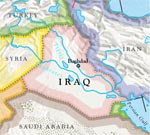The Sons of Iraq - US military's ragtag nemesis to terrorism
 Muqdadiya, Iraq The new heroes of Iraq aren't an impressive lot at first glance. The concept of spit-and-polish just doesn't apply, but what the Sons of Iraq (SOI) lack in appearance they make up for in their contribution to Iraq's improved security situation, say the US military.
Muqdadiya, Iraq The new heroes of Iraq aren't an impressive lot at first glance. The concept of spit-and-polish just doesn't apply, but what the Sons of Iraq (SOI) lack in appearance they make up for in their contribution to Iraq's improved security situation, say the US military.
They man checkpoints around the clock, vetting persons and vehicles entering and leaving the neighbourhoods in which they live; they detain suspect individuals for handing over to Iraq police; and they report suspicious activity and individuals to US military forces.
They are, in short, the basic building block for establishing and maintaining security the "hold" factor in the US "clear, hold, build" strategy of counterinsurgency.
"The fact is ... (they) are helping provide security in these villages (in the country) and (protect) the infrastructure," US Air Force Colonel Donald Bacon, chief of strategy and plans and strategic communications for Multinational Forces in Iraq has said. "Without them, AQI (al-Qaeda in Iraq) would move back into these areas if we didn't have our forces there."
The SOI, formerly called the Concerned Local Citizens, are armed citizen watch groups. The US military funds them to help secure neighbourhoods and block freedom of movement by the supporters of the Al-Qaeda terrorist network.
They first sprang out of the Sunni "Awakening," in which Sunni tribes and their militias revolted against al-Qaeda and other terrorists, fought them and then began cooperating with US military forces. From a small beginning of hundreds and then a few thousand men, it has grown and spread from Anbar province to nearly 80,000 in many parts of the country.
In Baghdad, after US troops were "surged" into the capital last summer and autumn to clear out terrorists and give the Iraqi government breathing space to earn the loyalty of its people through reconciliation and reconstruction measures, it was SOI groups that gave a 24-hour, 7-day-a-week physical security presence to cleared communities and allowed US troops to cut their numbers and move against terrorists and insurgents elsewhere.
"They're doing a great job," said Capt. Vince Morris, a company commander with the 3rd Squadron, 2nd Stryker Cavalry Regiment, in Diyala province. "They come up with good tips on arms caches and suspects and are helping keep AQI out of here."
Morris made his comment just before meeting a dozen sheikhs and village leaders from around Himbus, a small farming town in Diyala province's "bread basket" area. The sheikhs were all signing new two- month, renewable SOI contracts with Morris for his area of authority.
Some SOI groups had been established soon after US forces drove al-Qaeda from the area in early January, but new agreements were drawn up in which the sheikhs themselves became personally responsible for SOI adhering to established Iraqi law. It was a move to bring added pressure on the volunteers as well as their leaders to toe the legal line: No heavy weapons, no patrolling away from their checkpoints, no carrying of weapons when off duty; no arrest powers, only temporary detention for handover to police.
The Shiite-dominated government of Prime Minister Nouri al-Maliki has openly opposed the SOIs, which are mostly Sunni, except in mixed sect communities. About 20 per cent are expected to eventually join the Iraq police or Iraq army, and the government fears the remainder may become a new militia with which to contend.
The United States military says it is doing at least two things to help alleviate the worry. It closely vets new SOI recruits, and troops daily visit their checkpoints unannounced to check adherence to the rules.
It also is starting a pilot programme in which SOI who do not join the Iraqi police, army or other official security organizations are taught practical skills plumbing, construction, electricity, carpentry, for example and put to work in reconstruction at the same rate of pay as SOI: about 300-350 dollars per month for ordinary guards; 450 dollars per month for checkpoint leaders and 600 monthly for heads of community groups.
"I don't have a job," Hazem Abdullah Ali, a middle aged SOI recruit told a reporter. "I need the job. And I want to help bring peace."
"All of these (SOI) are good guys," said the muktar (leader) of a village called Shumaki. "I don't have any jobs for them so they were interested in this one. And they do good, they know who belongs in their neighbourhood, they know who the bad guys are who were in the area and they are keeping them out."
They also live with constant danger. Because of their effectiveness they have become a prime target al-Qaeda suicide bombers. (dpa)